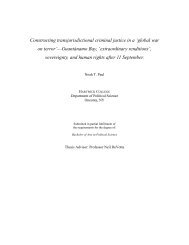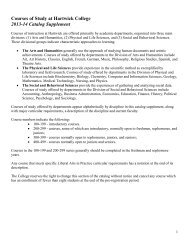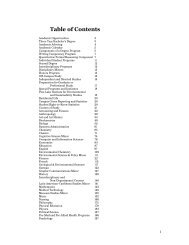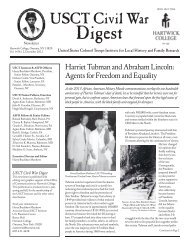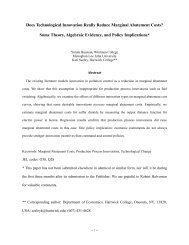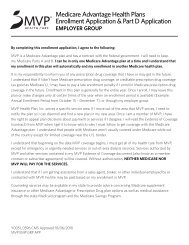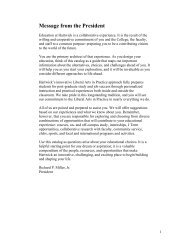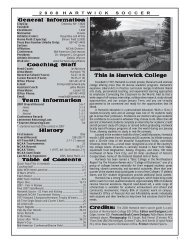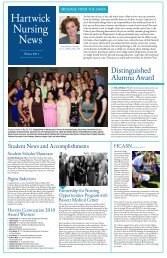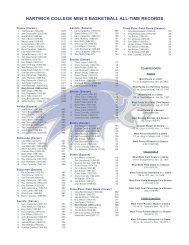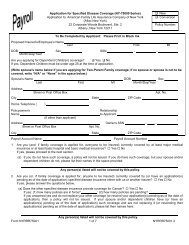Table of Contents - Hartwick College
Table of Contents - Hartwick College
Table of Contents - Hartwick College
Create successful ePaper yourself
Turn your PDF publications into a flip-book with our unique Google optimized e-Paper software.
Students in the Environmental Science and Policy Program select from a<br />
set <strong>of</strong> courses designed to provide a broad exposure to many different<br />
perspectives on the environment, from the physical and life sciences to<br />
the social sciences. By fulfilling these requirements, students in the<br />
program earn a minor in Environmental Science and Policy.<br />
Individual Student Programs<br />
A student whose main interests are not met by one <strong>of</strong> the standard<br />
departmental majors may design an individual program <strong>of</strong> concentration,<br />
comparable in depth <strong>of</strong> study and number <strong>of</strong> courses to departmental<br />
majors. In designing and carrying out such a program, the student will<br />
work closely with the Faculty Committee on Individual Student Programs,<br />
which oversees this part <strong>of</strong> the curriculum.<br />
Individual Student Programs have been developed in a wide variety <strong>of</strong><br />
areas. Some, for example, focus on fields in which <strong>Hartwick</strong> <strong>of</strong>fers<br />
programs <strong>of</strong> study but not majors, as suggested by the following recent<br />
titles: “Photo Journalism,” “Crime and Justice,” and “Comparative Study<br />
<strong>of</strong> Religion and Society.” Sometimes programs are combinations <strong>of</strong> a<br />
major interest in one discipline with a complementary secondary<br />
specialization, or an interest that cuts across many disciplines, such as<br />
“Scientific Writing and Illustration,” “Graphic Design and<br />
Communications,” and “International Economics.”<br />
Some programs center on areas <strong>of</strong> concentration that lead toward specific<br />
career objectives, such as “Human Resources Management,” “Political<br />
Journalism,” “Horticulture,” and “Marketing Communications.”<br />
Occasionally programs emphasize a particular field within a discipline,<br />
such as, “Analytical Technology,” “Creative Writing,” and “Cognitive<br />
Science.”<br />
The program <strong>of</strong> study is developed by the student in consultation with<br />
faculty members <strong>of</strong> the student’s choice along with the coordinator for<br />
Individual Student Programs. The program must meet all requirements <strong>of</strong><br />
Curriculum XXI. The student then meets with the Committee for its<br />
consideration <strong>of</strong> the proposed program, working through whatever<br />
modifications seem appropriate to the Committee. When the program is<br />
approved, the student pursues it with guidance from a program advisor<br />
selected from among the faculty by the student. Any changes in the<br />
approved program must be accepted in advance by the Committee.<br />
Students interested in developing an ISP should contact the coordinator<br />
for the Faculty Committee on Individual Student Programs as early as<br />
possible. At the latest, a preliminary proposal for an Individual Student<br />
Program should be submitted to the committee during the spring term <strong>of</strong><br />
the student’s sophomore year, and a full proposal must be completed and<br />
approved by the committee before the beginning <strong>of</strong> the Fall Term <strong>of</strong> the<br />
student’s junior year, unless the student receives financial aid from New<br />
York State (TAP, Regents or nursing scholarships). Recipients <strong>of</strong> such<br />
financial aid should be aware that they cannot be certified for payment<br />
9



